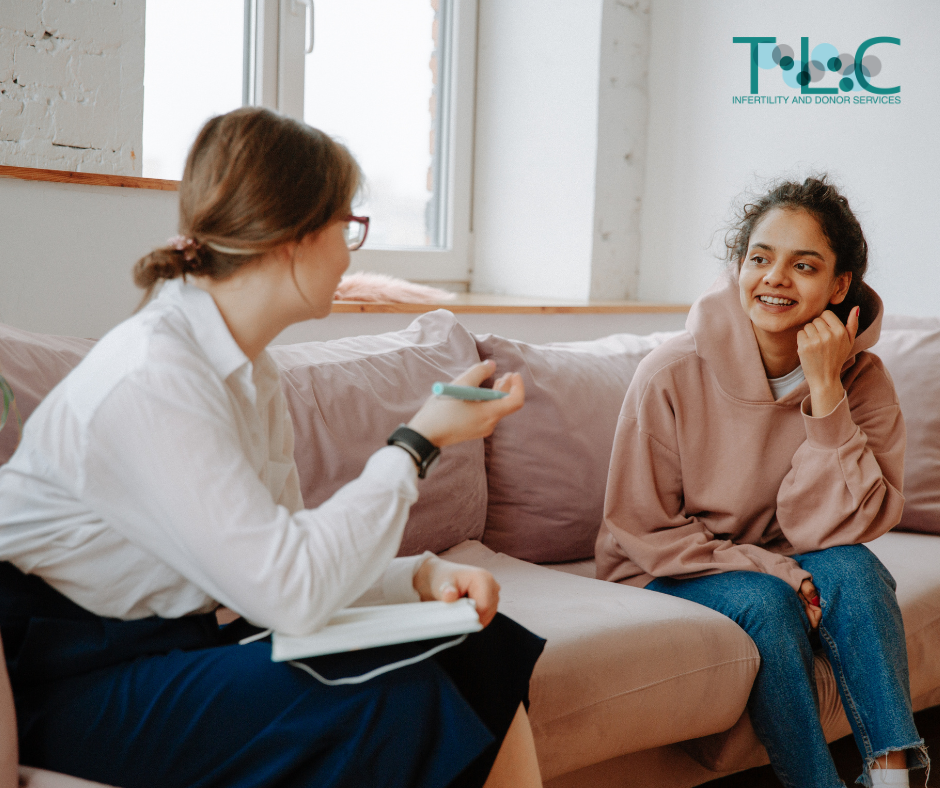Becoming an egg donor is a generous and life-changing decision—one that gives intended parents the chance to start or grow a family. But before you begin the process, it’s important to understand what’s involved, what’s expected, and how to determine if egg donation is the right path for you.
At TLC Infertility and Donor Services, we specialize in working with highly-educated, high-achieving donors who are motivated to help others while preserving their own health, privacy, and future fertility. If you’re considering becoming an egg donor, here are the top questions to ask before you begin.
1. Am I eligible to be an egg donor?
Not everyone qualifies to become an egg donor—and that’s okay. Each donor program has specific criteria to protect your health and the success of the donation. At TLC, we’re looking for young women who:
– Are between the ages of 20 and 31
– Are nonsmokers and in excellent physical and emotional health
– Have a BMI under 28
– Have no personal or family history of genetic or inheritable health conditions
– Are currently enrolled in or have graduated from a four-year college or university
– Additional screening will include a detailed medical history, a psychological evaluation, and drug/nicotine testing. If you meet these qualifications, you could be an excellent egg donor candidate.
2. What does the egg donation process involve?
Egg donation is a multi-step process that includes screening, matching, medical treatment, and egg retrieval. You’ll go through:
– Initial application and screening
– Medical and psychological evaluations
– Legal counseling and signing of contracts
– A 10-14 day course of hormone injections to stimulate egg production
– A short outpatient retrieval procedure, performed under light sedation
Throughout the process, TLC coordinates your appointments, provides guidance, and ensures you’re medically and legally protected every step of the way.
3. Will it hurt? What are the risks?
Discomfort is typically mild and manageable. The most common side effects are bloating, cramping, or mood swings due to hormone injections. The egg retrieval itself is done under IV sedation, so you won’t feel pain during the procedure.
Serious complications are rare, but they can include ovarian hyperstimulation syndrome (OHSS) or infection. Our team partners with top fertility clinics that take every precaution to minimize risks and safeguard your health.
4. How many times can I donate?
The American Society for Reproductive Medicine (ASRM) recommends a maximum of six egg donation cycles per donor. This helps limit potential health risks and ensures genetic diversity for recipient families.
TLC monitors this closely and will guide you through what’s appropriate for your personal and medical circumstances. You’re never obligated to donate more than once.
5. Will donating eggs affect my future fertility?
Egg donation does not reduce your chances of having children later in life. Women are born with hundreds of thousands of eggs, and each month, your body naturally prepares multiple eggs—most of which are reabsorbed.
Fertility medications used during egg donation help your body mature more of those eggs in a single cycle, but they do not deplete your overall egg supply. Long-term studies have shown no increase in infertility among donors.
6. Is egg donation anonymous?
It depends on the preferences of the intended parents and the donor. At TLC, we present match opportunities to you based on the type of arrangement the intended parents are seeking—whether anonymous, semi-known, or known—so you can ensure it’s the right fit for you.
Most of our matches are open ID, meaning the donor agrees to allow contact from the donor-conceived child once they turn 18, should they choose to reach out. This option offers a balance between privacy and future transparency.
Regardless of the arrangement, you will not be co-parenting or involved in the child’s life unless specifically agreed upon. The intended parents will be the legal parents, and all terms will be clearly outlined in your contract.
7. How much will I be compensated?
TLC works with intended parents who highly value education, achievement, and character in a donor. Because of that, our donors receive generous, meaningful compensation, often ranging upwards of $15,000+ per cycle, depending on qualifications and experience.
This compensation is for your time, effort, and commitment—not for the eggs themselves. TLC ensures all compensation complies with ethical and legal standards.
8. How long does the process take?
Once you’re matched with a family, the full donation process typically takes 10 to 14 weeks, including screening, legal clearance, and medical treatment. Much of this time is flexible and can be scheduled around school or work.
TLC will work closely with you to arrange travel (if needed), appointment times, and support throughout your cycle.
9. Can I donate if I’m on birth control?
In many cases, yes. However, certain methods—like the Depo-Provera shot or hormonal IUDs—may need to be paused or removed to allow your cycle to be properly regulated.
We’ll review your specific situation during the screening process and work with you and your doctor to determine the best approach.
10. What if I still have questions?
That’s what we’re here for! Egg donation is a deeply personal decision, and no two journeys are the same. Whether you’re ready to apply or just starting your research, TLC is happy to answer any questions not covered here.
We take pride in offering transparent, respectful, and supportive guidance to each donor candidate. You’re never alone in this process.
Ready to Learn More?
If you’re curious about becoming an egg donor—or ready to start your application—TLC Infertility and Donor Services is here to help. We’re honored to support compassionate, accomplished young women in this meaningful journey.
Still have questions? Reach out to us—we’re happy to chat.






